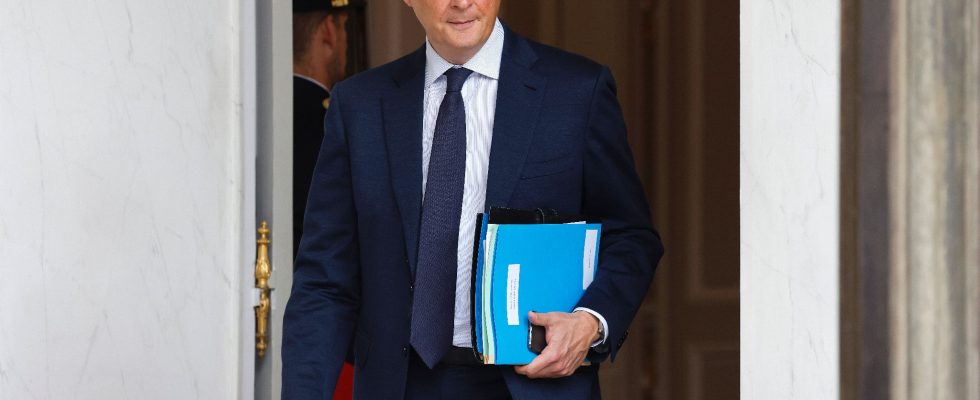A resounding no. On September 24, Emmanuel Macron invited himself to the French television station during yet another live intervention, this time in the form of a question-and-answer session. Obviously, the subject of rising prices, which had persisted for many months, quickly came to the table. To the question: “should salaries be indexed to inflation?” The Head of State had rejected this, believing that this mechanism would cause an inflationary loop. This macroeconomic phenomenon occurs when wage and price increases are self-sustaining. Concretely, if the majority of companies decide to inflate their employees’ pay slips to maintain, at least in part, their purchasing power, they may find themselves forced to increase the prices of the products or services they offer. for sale, thus causing the famous spiral. In recent months, both the government and employers have threatened this.
A loop that has not yet appeared
But what is it really? Most economists say that France is not currently experiencing such a situation. “It is only salaries at the minimum wage level which have roughly kept up with inflation due to the indexation mechanism, and undoubtedly high salaries, who are capable of negotiating. Between the two, there is no there have been no significant adjustments,” assures economist Jézabel Couppey-Soubeyran, lecturer at Paris 1 Panthéon-Sorbonne University. But the risk cannot be ruled out.
In the space of a year, the minimum wage has been revalued four times, an increase of 6.6%, higher than inflation expected at +5.8% in 2023. “In reality, this automatic indexation poses a problem for people who are just above the minimum wage”, regrets Mathieu Plane, deputy director of the Analysis and forecasting department at the French Observatory of Economic Conditions (OFCE). “We must address the problem of low wages, but it is not simple,” he continues. This was the whole point of the social conference which took place on October 16. At the end, Prime Minister Élisabeth Borne announced the upcoming creation of a High Council for Remuneration, without ultimately making much progress. For Mathieu Plane, the whole challenge is to “maintain the purchasing power of the most modest without triggering a price-wage loop, we have to find the right compromise on this. There is no obvious solution.”
Wage indexation, a good idea?
Before this conference, the CGT and Force Ouvrière demanded an indexation of wages to inflation, as in Belgium where the mechanism has existed since 1920. But the government is opposed to it. And for good reason, the past proves him right. “Indexing in the 1970s really harmed us a lot: it caused great damage to the real economy and it then took a very long time to cause disinflation in the 1980s,” recalls Agnès Bénassy-Quéré, second vice-president. Governor of the Bank of France. If everyone knows that salaries are indexed, naturally, inflation expectations will change”, and will therefore no longer be reliable.
Among the dissonant voices, the economist Patrick Artus. The director of research and studies at Natixis believes that the phenomenon has indeed taken place in recent months. According to him, France “will have difficulty bringing down inflation” because “wages will increase further. And as there are no productivity gains, business costs will increase and inflation will only slow down a little.” Furthermore, he criticizes the proposal for indexation of salaries and any form of constraint on the part of the executive. “I do not see the legitimacy that the government would have in imposing wage increases. We must let the unions and company management negotiate branch by branch. Companies are in very different situations, wage increases cannot not be identical.
The situation should be reversed
Between the end of 2019 and the end of 2022, average productivity fell by 3.4%. And this fall is expected to continue into 2023. The trend could, however, be reversed next year. “In 2022-2023, the unit wage increased less quickly than consumer price inflation. In 2024-2025, we expect the opposite. We are at the moment when the situation is turning around. The Bank of France also anticipates that companies will be able to absorb the increase in labor costs through an increase in productivity. We believe that part of the loss of productivity is sustainable, but that not all of it is,” explains Agnès Bénassy-Quéré. .
Conversely, several economists agree that there is a price-profit loop. With the explosion in the price of inputs, companies have increased their prices. But when the cost of raw materials began to fall, they took advantage of it to keep prices high and thus increase their margins. “The underlying trend in our economies is that of greater concentration in different sectors, particularly in the agri-food industry. Many players are able to pass on the increase in the cost of their inputs to prices, due to their market power. This can really lead to a loop. Employees and consumers come out as doubly losers,” explains Jézabel Couppey-Soubeyran. A situation that could last. While commercial negotiations between manufacturers and distributors open at the beginning of November, Michel-Édouard Leclerc, boss of the centers E.Leclerc, declared that, due to a lack of goodwill from the agri-food groups, there would be no price reduction. And this despite repeated calls from the government to this effect.
